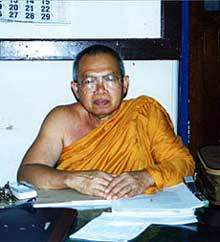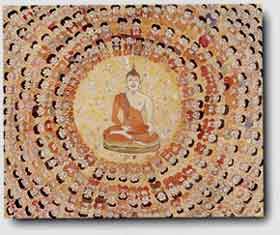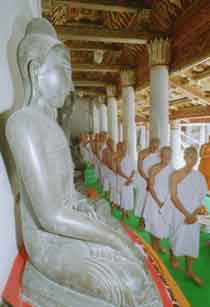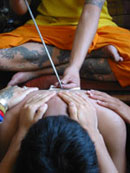Talking about Buddhism
Ordaining as a monk is seen as the rite of passage into manhood for most Thai men. Roughly half of the male Thai population has spent time in the monkhood. There are over 27,000 Buddhist temples in Thailand, most of which are out in the countryside. Over 90 percent of the Thai population practices Theravada Buddhism, making it a cornerstone of Thai society.
I headed down to one of Bangkok’s bigger Buddhist temples, Wat Mahadhatu, and spoke to one of the senior monks there about the Lord Buddha and his teachings.
Wat Mahadhatu is frequented by people from around the world seeking to learn more about Buddhism and often signing on for a one-day to one-month meditation course. In 1999 there were 522 foreign students representing 50 nationalities at Wat Mahadhatu, 249 of them male and 273 of them female. The temple itself is home to 213 monks, 41 novice monks, and 35 Buddhist nuns.
Monk Supat Kosalo has been a monk for a total of eleven years. He left the monkhood to have a family and returned four years ago. Theravada monks are celibate and monks may choose to leave the monkhood at any time.
have a family and returned four years ago. Theravada monks are celibate and monks may choose to leave the monkhood at any time.
In brief, the Lord Buddha was born in India as Prince Siddhartha Gautama in 563 BC. His mother died shortly after childbirth. He had a rich, sheltered, and splendid life, was married to a princess, and had a son. He led a luxurious life. One day he left his palace and saw an old man, a sick man, and a corpse. He was about the age of 40. This was to change his life because now when he looked at life, all he saw was suffering. It weighed heavily on his heart.
Prince Siddhartha soon after left his palace and his family, cut his hair and beard, put on plain clothes, and began his spiritual journey. He set out to find the most renowned spiritual teachers and practiced their doctrines. He became an ascetic and nearly starved to death.
He decided that these were not the correct paths and thought a less extreme or ‘middle way’ method of learning and meditation would be the best. He set out on his own to seek the truth, determined to find the path to enlightenment. He sat in the shade of a tree determined to reach his goal, which he did. Enlightenment is a state of mind where there is no illusion, where one is at peace and bliss with the world, and where one’s desires have become extinct.
learning and meditation would be the best. He set out on his own to seek the truth, determined to find the path to enlightenment. He sat in the shade of a tree determined to reach his goal, which he did. Enlightenment is a state of mind where there is no illusion, where one is at peace and bliss with the world, and where one’s desires have become extinct.
The Buddha realized what is known as the four noble truths: 1) that existence is subjected to dukkha–stress, disease, and unhappiness; 2) dukkha is caused by desire (called tanha); 3) if one eliminates desire, dukkha will no longer exist; 4) the way to eliminate desire and suffering is to follow the Eightfold Path: Correct understanding, thought, speech, bodily conduct, livelihood, effort, attentiveness, and concentration.
He wandered the country teaching his doctrines and gained a large following of disciples. His teachings later became the Tipitaka, or the Buddhist ‘Bible.’ He spent the rest of his life spreading his beliefs. He died in 483 BC. Buddhism is the result of people following the Lord Buddha’s teachings. Buddhism reached what is now known as Thailand about 2,000 years ago.
beliefs. He died in 483 BC. Buddhism is the result of people following the Lord Buddha’s teachings. Buddhism reached what is now known as Thailand about 2,000 years ago.
Monk Supat Kosalo summarized the main point of Buddhism as: “Do good, receive good. Do bad, receive bad. Purify your mind. The only way to purify your mind is to meditate.” He continued, “there are many rules of Buddhism and over 84,000 teachings and methods, but the basic precepts are not to steal, not to lie, not to cheat on your spouse, not to kill, and not to take strong drinks. These are the basic rules for all Buddhists. A monk has 227 rules to follow.”
Monk Supat Kosalo stated that the goals of meditation are “to purify the mind, to get rid of sorrow and lamentation, to get rid of physical and mental suffering, to understand the truth of life and that everything is impermanent, and to extinguish suffering by reaching Nirvana.
“By being a Buddhist you need to express metta–loving kindness to all beings, human and non-human, karuna–compassion towards all creatures, mudita–joy for other people’s success, and upikkha–calmness and acceptance of whatever happens to you in life.
“Body and mind are the two things that every nationality shares. There are only two sexes: male and female. We all clean our clothes and body with soap. The only way to clean your mind is to meditate.
“Buddhism teaches that life does not begin and end with birth and death. There is a link in a chain of lives. By doing good and making good karma a person can reduce their number of rebirths. By obtaining Nirvana, one does not need to be born again. The Lord Buddha is not coming back. The Buddha said, ‘Do not believe in me because someone told you to. Try for yourself. Help yourself.”
When asked to explain how karma works Monk Supat Kosalo stated, “when you plant mangoes, you use a seed, the earth, and water. When you eat mangoes you are not eating seed, soil, or only water. You eat the fruit. Karma works like this. You do not see it, but it is all there.”
